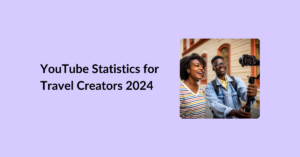Nearly 114 million individuals and businesses are competing on YouTube for attention. Only 0.028% of channels have cracked the code to date — only 0.028% of channels have a million subscribers or more.
This means ranking on YouTube is a huge win and a tough competition.
And as you already know, it all begins with “YouTube SEO” and “keywords”.
Since we’ve done an in-depth guide on YouTube SEO earlier, we’ll be diving deep into SEO keywords in this guide. We’ll help you how to find SEO keywords for your YouTube video or even your entire channel — step by step.
Let’s get started!
How do I find SEO keywords for my YouTube video?
Technically, you can create a YouTube video on any topic relevant to your niche and primary mission. But if you want to get reach quick and grow your viewership, you have to find topics that your target audience is most interested in.
These topics can be located by finding the right keywords.
Here’s how you can find SEO keywords for YouTube videos:
Step 1: Brainstorm topic ideas with ChatGPT (Optional)
As mentioned earlier, when you’re seeking inspiration or simply want to explore fresh content ideas, you can make use of ChatGPT. Several SEO experts agree that it can be a valuable ally.
Just engage in a conversation with this powerful language model to brainstorm topic ideas related to your niche. It can provide creative insights and spark new directions for your content.
For example, if you have a channel on fitness training — you can ask ChatGPT to give you 30 unique video topic ideas for this niche.
Here’s what it produces:
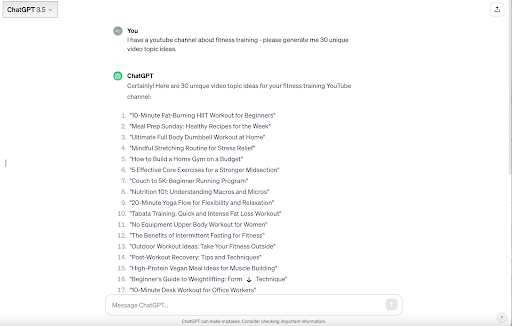
Now, these are some very unique directions for content production — but which one do you work on?
- Pick out 3-4 that interest you the most
- Go to Google Trends
Enter your favorite topics and compare which of the four is more promising. Ideally, the topic with ongoing demand in your target geographical region works best.
Details in the next step!
Step 2: Verify through Google Trends (Optional)
Let’s continue with the “fitness training” example above. We picked the top five topics suggested by ChatGPT.
Here’s what Google Trends gave us:
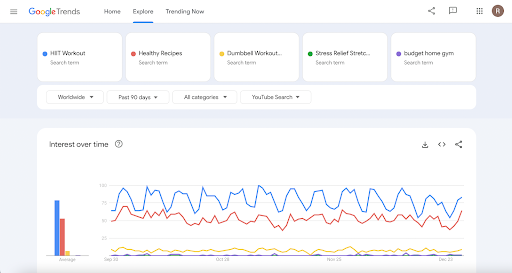
Notice a few things here. When entering the comparison term, we reduced the topic length to 2-3 words. If you search for longer terms, Google Trends won’t give any results. So, sum up the topic and enter only the gist of the topic for comparison.
Moreover, adjust the filters to:
- Worldwide OR target geographical locations
- 90 days OR more
- All categories OR respective category
- YouTube search
In this way, you’ll get the data you really need.
From our search results, the most promising keyword is HIIT workout. So, if you are starting a channel from scratch and need quick attention, what you can do is create a content cluster around HIIT workout. Create a playlist with at least 10-15 YouTube videos on the same topic.
Ask ChatGPT to find out 20 semantically related keywords for the term “HIIT Workout” — each with a different search intent.
This is what it produces:
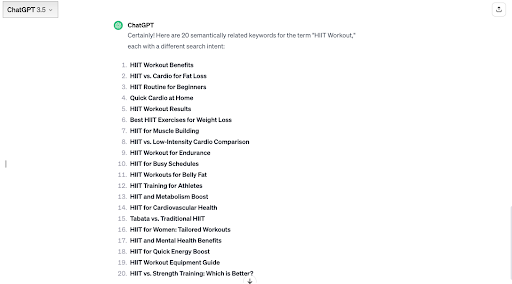
Pick as many as you like for YouTube videos. We recommend creating at least 10-15 YouTube videos with a minimum length of five minutes each.
You might wonder how is Google Trends helping you.
Well, Google Trends basically helps you identify which keyword term is currently a hot topic and worth investing in – for quick returns. If the graph shown for the entered keyword is near the baseline, we do not recommend investing time and effort in filming a video for that keyword UNLESS you’re okay with seeing the results years later.
Step 3: Go to a Keyword Research Tool And Do This
The above two steps are optional. You can directly begin with this step too — but again, only if you’ve been creating content for a while and have a solid know-how of what your audience might want to see.
Plus, this step also requires some technical knowledge. Allow us to walk you through.
The top keyword research tools for top YouTube keywords are:
- TubeBuddy
- Keywordtool.io
- Ahrefs Keyword Explorer
- Keywords Everywhere
- Kparser
- VidIQ
- Keyword Tool Dominator
Using these tools, you can look up keywords with high search volume and low competition.
For example, let’s say we choose to go with the keyword tool “Keyword Tool Dominator”
It’s a free tool. When we entered the term “HIIT Workout” and went with default settings for location and other metrics, these are the results we got:
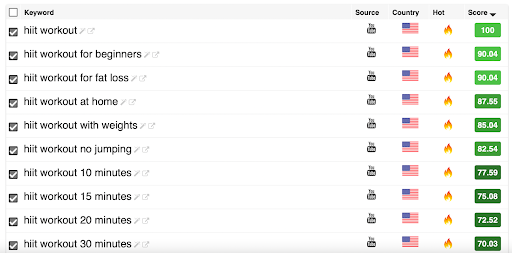
As per the results, we can see the top three are the best to work on.
This tool is pretty easy to use for anyone who is not familiar with the technical aspects of keyword research. But if you are using a paid tool like Ahrefs, you’ll need to know some technical terms and how to use these to filter out the best keywords.
Examples of these technical terms include:
- Search volume
- Competition
- Click-through rate
- Cost-per-click
- Search intent
We recommend learning about these terms in deeper detail from this guide: YouTube SEO – How to find best traffic-generating keywords?
Step 4: Go to Google.com & YouTube Search Bar
Heading to Google.com and the YouTube search bar can greatly help in refining your SEO keyword strategy.
On Google, initiate your exploration by typing in your primary keyword. Observe the autocomplete suggestions for potential related queries and scroll to the bottom for additional keywords under “Searches related to.” Analyzing featured snippets can reveal content gaps and guide you in tailoring your video to address specific user inquiries.
Next move to the YouTube search bar. Enter your keyword. This will reveal suggested searches and some useful insights into prevalent queries within the platform.
Explore the top video results, scrutinizing titles, descriptions, and common themes to understand what resonates with the audience. Leverage YouTube’s filters to refine your search.
Overall, this dual-platform approach ensures a comprehensive understanding of user behavior. It will help you optimize your video for both search engine results and the unique dynamics of YouTube.
Tips to Do Better with SEO Keywords
Here are some tips to do even better SEO keyword research for your YouTube videos:
1. Think about your audience
When optimizing your YouTube videos with SEO keywords, never lose sight of your audience.
Consider the language and terms they are likely to use when searching for content. Tailor your keywords to match the way your target audience thinks and searches.
Understanding their preferences, pain points, and interests will guide you in selecting keywords that resonate with them. Also, take a moment to step into the shoes of your viewers and anticipate their queries and needs.
By aligning your keywords with audience expectations, you not only enhance your video’s discoverability but also create content that genuinely connects with and serves your viewers.
2. Think about your long-term goals
Effective SEO goes beyond short-term gains; it’s about laying the groundwork for sustained success. So when choosing keywords, think about the long-term relevance of your content.
Opt for keywords that align with your overarching content strategy and business goals. Consider the evergreen nature of certain keywords that will maintain relevance over time, ensuring that your videos continue to attract viewers well into the future. This forward-thinking approach not only boosts your current SEO efforts but also contributes to the enduring visibility and impact of your video content.
3. Research your competitors
Staying competitive requires a keen understanding of what others in your niche are doing. Conduct thorough research on your competitors, especially those with a strong online presence.
Identify the keywords they are targeting and analyze the performance of their videos. This insight can lead you to untapped opportunities and help you refine your own keyword strategy.
By learning from your competitors’ successes and challenges, you can strategically position your content to stand out.
Remember, it’s not about copying but about leveraging competitor research to inform and elevate your own unique approach, ensuring that your videos capture attention in a crowded digital space.
FAQs
You can find SEO keywords using dedicated keyword research tools like Google Keyword Planner, SEMrush, or Ahrefs. Additionally, leveraging Google Trends and exploring related searches on Google and YouTube can provide valuable insights.
Identify effective tags by researching popular keywords in your niche using tools like YouTube’s own search bar, Google Trends, or dedicated tag generators. Select tags relevant to your content to improve discoverability. Read our YouTube SEO guide for further details.
Discover free SEO keywords by utilizing tools like Google Keyword Planner, Ubersuggest, or AnswerThePublic. You can also use Google Trends and explore autocomplete suggestions on search engines to identify relevant keywords at no cost.



